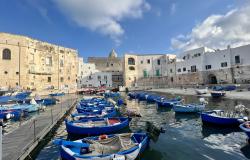Language Tip of the Week
by Pat Eggleton |
We all know that “arrivederci” means “goodbye” but what if someone says “arrivederla”? What is the difference?
Well, don’t worry because the person is…
by Pat Eggleton |
The suffix –ino [masculine] or – ina [feminine] means “little”:sorella – sister;sorellina – little sistercaro – dear;carino – dear in the sense of “cute”The…
by Pat Eggleton |
Words by Pat Eggleton
You will all know that an Italian wouldn’t dream of beginning a meal without wishing everyone else at the table “Buon appetito” – the…
by Pat Eggleton |
Words by Pat EggletonTo ask if something is sold in a shop, we saysi vende plus objectif we are asking about one thing. - "si vende il pane? Do you sell bread…
by Pat Eggleton |
Words by Pat EggletonNervoso doesn’t mean “nervous”. It means “irritable”. If you want to say you are nervous, you should say, Sono ansioso / a. Una camera…
by Pat Eggleton |
Words by Pat Eggleton“Prego” often causes confusion because it is used a lot. It can be used to mean “You’re welcome” or “Don’t mention it” after someone has…
by ITALY |
Confetti are not tiny dots of coloured paper but the sugar-coated almonds that Italians give you before weddings, Christenings and graduations. The verb…
by ITALY |
Spaghetti are plural in Italian and Italians are always very amused when English-speaking folk treat the word as a singular noun. If you want to say “the…
by ITALY |
This is a tip for all you romantic souls out there.
Have you ever seen the initials TVB carved on a tree or as part of a graffito in Italy? You may have seen…
by Pat Eggleton |
Words by Pat Eggleton
Plurals can be confusing in Italian, the good news is that some Italian words don’t change in the plural , eg:
Words that end in…
Suggested Italian Properties
Featured experiences in Italy
Culture and Art, Outdoor Activities, Tour Operator, Tours
Abruzzo
Culture and Art, Food & Wine, Shopping, Tours
Milan
Cooking School, Food & Wine, Outdoor Activities, Tours
Barolo
Culture and Art, Food & Wine, Tour Operator, Tours
Marche

















